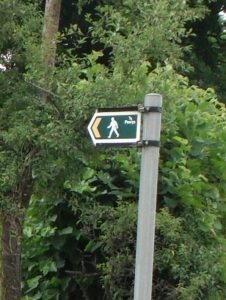Support us from £3/month
We deal with almost 1000 cases a year assisting communities, groups and individuals in protecting their local spaces and paths in all parts of England and Wales. Can you help us by joining as a member?
A question was asked at the full meeting of Powys County Council last month by Peter Newman, our local correspondent for Powys, about the failure of the council to comply with the 1968 Countryside Act. This laid a duty on highway authorities to signpost all public paths where they leave a metalled road.

Peter went on to say that only 69 signposts were erected in the last financial year, which equates to 23 each for of the old counties of Brecknock, Radnor and Montgomery, and he asked how many signposts are needed to complete the requirements under the Act, and the timescale.
The Portfolio Holder for Finance, Countryside and Transport, Councillor Aled Davies, was not present but in a written reply said the Ccouncil was unable to supply the information. In a follow-up question Mr. Newman pointed out that Powys had done a number of surveys, as had the Countryside Council for Wales, which could have been used as a basis to estimate the number of signposts needed to complete the council’s legal statutory duty under the Act. He requested that Aled Davies look again at his question with the information he had now provided.
The council has now estimated that 6,280 fingerposts would be needed to meet the legal requirement of signposting every path where it leaves a metalled road. Says Peter: ‘At the current rate of 69 a year I make that 91 years!’
A second question to the council, from another elector, Graham Taylor, had a similar theme. He referred to the review of the Rights of Way Delivery Plan (ROWIP)and highlighted the survey undertaken as part of the review; this had revealed that the main problem encountered by users of footpaths and bridleways was the lack of signposting and waymarking. Graham too was not happy with the response from the portfolio holder and, in a supplementary question, asked for an assurance that the new ROWIP would accord the highest priority to a programme of works designed to make sure that open routes are properly signposted and waymarked. To do so, he concluded, would demonstrate that the cabinet is listening and responding to clear messages from residents.
